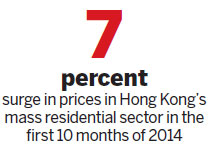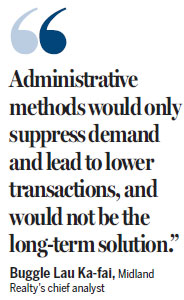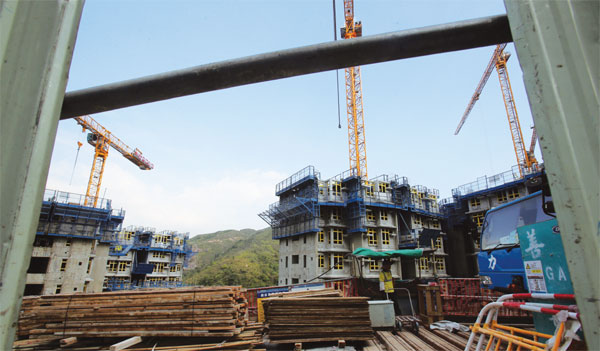Boosting HK land supply 'the only answer' for govt
Updated: 2015-01-09 05:34
By Sophie He in Hong Kong(HK Edition)
|
|||||||||
|
Owning a home in Hong Kong remains a distant dream for many people. The government's imposition of taxes has restricted the volume of property transactions, yet fared badly in curbing the surge in prices of small- and medium-sized flats. Edmond Tang / China Daily |
Property experts urge CE to come up with clear-cut plan to tackle housing problem
Boosting land supply to help ease Hong Kong's acute housing problem, as well monitoring the effects of the government's measures to rein in runaway property prices, should be given priority in Chief Executive (CE) Leung Chun-ying's 2015 Policy Address on Jan 14, scholars and real estate experts say.
Chau Kwong-wing, chair professor of real estate at the University of Hong Kong, told China Daily on Thursday he hopes Leung could come up with a clear plan to increase land supply.
"Land supply is paramount. Only with adequate supply can we start talking about raising the number of public rental housing or Home Ownership Scheme units," he said.
But, he admits it would not be an easy task, especially after the "Occupy Central" movement, as it would be very difficult for all stakeholders to come up with a consensus. "So, even if the government wants to launch major projects, you can expect strong resistance," Chau said.
He suggested that the most viable option is reclamation as it would mean creating more land because although there would still be resistance, the pressure would be lower than launching new projects on existing land.

Vincent Cheung Kiu-cho, national director of Greater China at Cushman and Wakefield, told China Daily he believes that this year's Policy Address may not be vastly different from last year's, but the main theme for the real estate sector should be to boost supply.
He hopes the government could adjust some of its measures previously introduced to curb property prices, including the Special Stamp Duty. He pointed out that, in order to avoid paying extra taxes, home buyers need to wait for at least 36 months if they want to resell units they had purchased. The period, he said, is too long and it suppresses the secondary market while forcing purchasers into the primary market.
Cheung urged the CE to elaborate on the government's Long Term Housing Strategy as it has opted for a total housing supply target of 480,000 units for the next 10 years with a 60:40 public-private split in new housing.
He said it would be helpful if the government can specify the proportion of rental housing and Home Ownership Scheme units, and offer a specified timetable for their launch.
Referring to the income limit for public housing applicants, Cheung hopes it could be eased slightly or modified by adjusting the proportion of government subsidies so that more people could qualify for public housing.
Real estate agency Midland Realty's chief analyst Buggle Lau Ka-fai said he would like to see land sales stepped up instead of further administrative intervention.
"We can see the government having done a lot trying to curb soaring property prices, mainly by imposing taxes. But, prices, especially for small- to medium-sized units, have continued to rise, and only the transaction volume in the property market has taken the hit," Lau said.

He argued that administrative methods would only suppress demand and lead to lower transactions, and would not be the long-term solution.
The government must boost supply in the long run to show it's determined to solve the city's housing problem and cool down property prices, said Lau.
So Kwok-kay, a partner at PricewaterhouseCoopers, told a press conference the government should keep an eye on the effects of its tightening measures for the housing market. "We think the government will monitor the local market to decide whether it should continue with further tightening measures," So said.
He explained that since interest rates are set to climb, the government needs to monitor the property market closely to avoid any rapid changes.
Joanne Lee, manager of research and advisory at Colliers International, said she did not expect any major policy shift in the city's property sector.
Despite the government's market cooling measures, property prices have continued to rise amid growing demand.
Price increases have been more evident in the mass residential sector - having surged by 7 percent in the first 10 months of 2014 - while the luxury segment has seen decreases of 1 percent.
Colliers expects overall residential prices to edge up by 5 percent in 2015. High construction costs, strong fundamental demand and inadequate supply, especially of mass properties in the urban areas, will keep prices high or at current levels, it said.
Agnes Lu contributed to the story.
sophiehe@chinadailyhk.com
(HK Edition 01/09/2015 page8)
